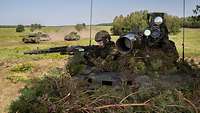





“The Federation shall establish Armed Forces for purposes of defence.” This is specified in Article 87a of the Basic Law for the Federal Republic of Germany. During the Cold War, this primarily referred to defence against a direct attack on the Federal Republic of Germany and its partners in NATONorth Atlantic Treaty Organization , as well as protection of the Alliance territory and the population against a potential aggressor. Today, the term “defence” is broader and includes new challenges such as cyber threats, international terrorism, and even protection against pandemics.
“The Federation shall establish Armed Forces for purposes of defence.” This is laid down in Article 87a of the Basic Law for the Federal Republic of Germany. Thus, the mission of the Bundeswehr is defence. During the Cold War, this primarily referred to defence against a direct attack on the Federal Republic of Germany and its partners in NATONorth Atlantic Treaty Organization. The purpose was to protect the Alliance territory and its population against a potential aggressor. Today, this has once again become the core mission of the Bundeswehr.
In addition, the Bundeswehr, alongside its partners, contributes to international crisis management and to national crisis and risk prevention. It also supports civilian authorities in the event of disasters in Germany within the framework of administrative assistance. The focus of the armed forces, however, has also increasingly shifted to new challenges such as cyber threats, international terrorism or hybrid attacks.

Laut Grundgesetz hat das Parlament die Budgethoheit und damit die Kontrolle über die Streitkräfte
Bundeswehr/Sebastian WilkeThe Bundeswehr is a parliamentary army. Fundamental decisions are made by the members of the German Bundestag. The budgetary sovereignty of the Parliament is enshrined in the Basic Law: The members of parliament decide how much money the Bundeswehr will receive and how it can spend it. Any deployment of Bundeswehr armed forces generally requires prior authorisation by the Bundestag. The Basic Law further states that a Defence Committee consisting of members of all parliamentary groups shall exercise control over the Bundeswehr. In addition, the Parliamentary Commissioner for the Armed Forces ensures that the rights of soldiers are safeguarded.
The Bundeswehr is a parliamentary army. Basic decisions, such as the deployment of armed German soldiers abroad, are taken by the Bundestag. As a symbol of the ties between Parliament and Bundeswehr, whose high importance is rooted in Germany’s history, special ceremonies take place in front of the Reichstag.
Before the Federal Government can send the Bundeswehr to an armed deployment abroad, it must submit a request for approval to the Bundestag. Only if the Bundestag approves the operation, it is deemed lawful. Details are laid down in the Parliamentary Participation Act.
Yes, in special cases. Whenever the Bundeswehr has to act quickly and, if necessary, in secret, prior consent of the Bundestag is not required. In 2015, the Federal Constitutional Court ruled that a referral to the Bundestag may be omitted altogether if an urgent mission has already been completed at the time of the earliest possible referral to the Bundestag. If a mission abroad launched without authorisation by the Bundestag is still ongoing, the respective decision will be made in the Bundestag at the earliest possible time.
Every soldier has the right to contact the Parliamentary Commissioner for the Armed Forces directly and personally without going through official channels.
Like all committees, the Defence Committee has the right to take action at own initiative with regard to matters within his/her area of responsibility and to make according recommendations without referral by the plenary. The committee of inquiry is the Parliament’s most powerful instrument to control government action. A special feature is that the Defence Committee also has the rights inherent to a committee of inquiry. It thus can obtain evidence, for example by questioning witnesses or requesting and inspecting files.
In Germany, armaments investments are subject to strict parliamentary scrutiny. All procurement and development projects of the Bundeswehr with an investment volume of more than 25 million euros require the separate approval of the Bundestag’s budget committee. Hence the name for these kinds of requests.
National and collective defence is the core mission of the Bundeswehr and constitutes the focal point based on which both the personnel and the materiel requirements of the armed forces are defined. This guiding principle lies at the heart of the new Defence Policy Guidelines, which were presented at the Bundeswehr Commanders' Conference on 9 November 2023. The aim of this policy document is to align the Bundeswehr to the requirements of the watershed era, which resulted from Russia's attack on Ukraine in February 2022.

„As the most populous and economically strong country at the heart of Europe, Germany must be the backbone of deterrence and collective defence in Europe.”
The Defence Policy Guidelines follow the National Security Strategy of the Federal Government presented in June 2023. On this basis, the Bundeswehr's missions were reformulated. In addition, guidelines are laid down for the overall concept of military defence – for example for the Bundeswehr’s future capability profile. Ultimately, it is about establishing a Bundeswehr that is operational, warfighting-capable and fit for the future.
You can download the Defence Policy Guidelines for the Zeitenwende here
Download PDF, barrier-free, 2 MBThe paramount task of German security policy is to ensure a life in peace, freedom and security in Germany. This is laid down in the first National Security Strategy for Germany that was presented by the Federal Government in June 2023.

„Providing security for its citizens is the most important job of every state, of every society. Without security there can be no freedom, no stability, no prosperity.”
An integrated security policy is at the heart. Matters related to internal and external security should be consistently taken into account in all decisions affecting state, society and economy. Actions of actors, assets and instruments must be harmonised when dealing with security-related issues. The aim is to create a Germany that is capable of defending itself and its allies against threats of any kind. Against this background, the Bundeswehr is regarded as a core instrument for ensuring integrated security.
National Security Strategy: Ensuring the security of the citizens of Germany and contributing to security in Europe.
National Security Strategy PDF, not barrier-free, 5.2 MB